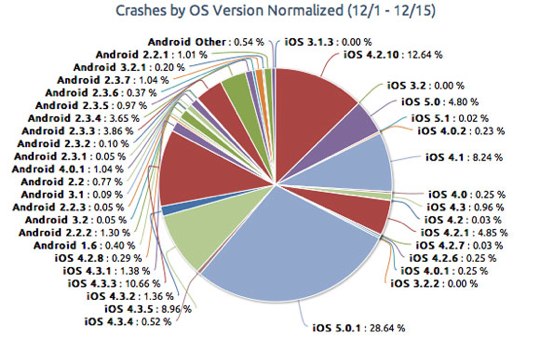 What crashes more, iOS apps or Android apps? That’s the question being asked by Crittercism these days in its study that spanned 23 iOS operating system versions and 33 Android versions.
What crashes more, iOS apps or Android apps? That’s the question being asked by Crittercism these days in its study that spanned 23 iOS operating system versions and 33 Android versions.
The results may not be what you would expect:
In the top quartile of apps, Android apps crashed 0.15% of the time they launched, while top quartile iOS apps crashed 0.51% of the time. In the second quartile of apps, Android apps crashed 0.73% of the time and iOS apps crashed 1.47% of their launches. In the third quartile of apps, Android apps crashed 2.97% of the time, while iOS apps crashed 3.66% of the time.
The study ran from December 1st through until December 15th, and shows that iOS isn’t as stable as its Android counterpart. There are some points of note, however, that should be discussed further in the future when talking about the stability of iOS and Android applications. First, iOS 5.01 was responsible for 28.64 percent of all crashes in the study. It’s not uncommon for applications on a new operating system to become unstable once a major new OS is released. That being said, iOS 4.2.1, and iOS 5.0 are both responsible for over 4 percent of all crashes, and iOS 4.1 weighed in at 8.24 percent of all crashes in the Critterrcism study.
Some thoughts
While the study provides some interesting insights into app crashes in both Android and iOS, it’s hard to put any weight in the results, and more importantly, it’s impossible to point a finger at which company, Apple or Google, should bear the brunt of the blame. There are just too many variables. First, of all the crashes, how many cases involved applications that weren’t updated to support new OS versions? Second, how many cases involved applications optimized for newer OS versions, but run on legacy hardware? We don’t have access to that information, and it’s that information that’s going to tell the whole story here.
The study does shed light on one thing very accurately, however. App Stores, while still in their infancy, need better mechanisms for weeding out applications that are no longer supported, and further, provide better information on what versions of an operating system an application supports. As a user, when I get a new phone, I’m heading directly to the App Store to download all of my favourite applications, and at no point am I considering whether the application has been optimized for my new handset yet. As a user, all I see is one of my favourite applications crashing a lot. That’s a huge problem for the majority of consumers.
Read Do iOS Apps Crash More Than Android Apps? A Data Dive on Forbes.






